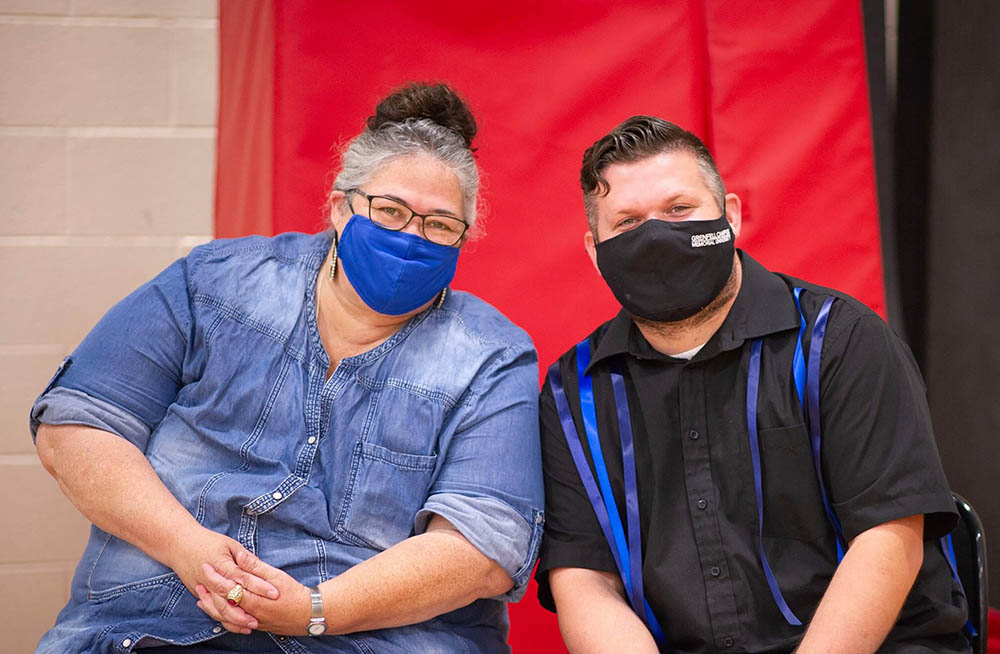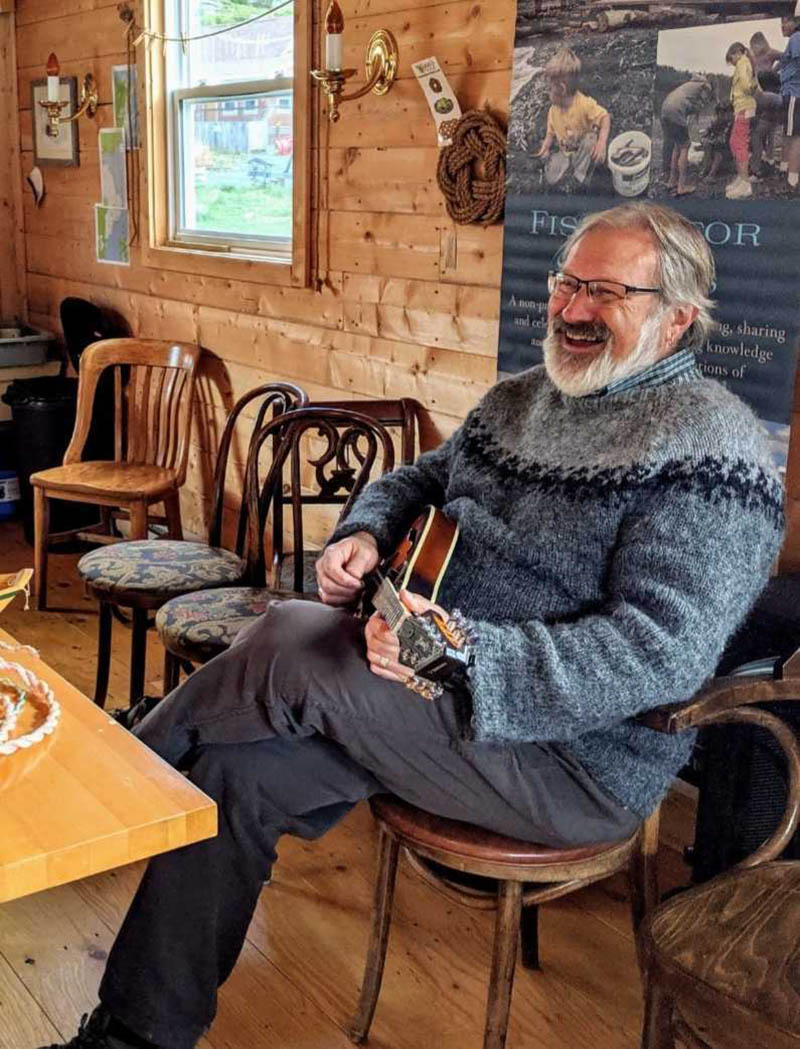Research Report: 2020
▼ Choose a report:

Powered by Research & Graduate Studies

Powered by Arts and Social Science

Powered by Fine Arts

Powered by Science and the Environment

Jump To:
The year 2020 saw continued research collaborations between Grenfell staff, students and faculty and Indigenous communities and organizations across the province and beyond. It also saw the important milestone of the passing of Memorial University's Research Impacting Indigenous Groups Policy, a first within Canadian universities.
The policy defines Indigenous Research based on Tri-agency's TCPS2, chapter 9 as primary research that is:
Moving into the implementation phase of the Policy has further emphasized the importance of continuing to build and maintain research relationships based on the "4Rs": Respect, Relevance, Reciprocity, Responsibility.

Ivan J. White and Kelly Anne Butler
With broad-reaching impact and implications, Grenfell staff member (in 2020) and adjunct faculty member Kelly Anne Butler, and now current Student Affairs Officer - Indigenous Affairs Ivan J. White, Grants and Contracts Facilitator Brady Reid and others have played leadership roles not only in developing the policy but also in assisting with and supporting it implementation. This has included assisting in initiating and nurturing respectful relationships between Grenfell researchers and local Mi'kmaw communities, presentations and personal assistance with questions, as well as creating learning resources such as the Maw-lukutinej project sessions and podcast series.
On the Great Northern Peninsula, Grenfell Campus's Offices of Research and Engagement, worked with the Northern Peninsula (Mekap'sk) Mi'kmaq Band, Norpen Aboriginal Women's Circle, and Norpen Status of Women's Council, to establish an "e-learning hub" in Port Saunders, located on the third floor of the Town Centre in Port Saunders. In the Bay St. George area, Grenfell partnered with the St. George's Indian Band to create an e-learning hub at the K'Taqmkuk Mi'Kmaq Historical Museum in St. George's.
Working with the St. George's Indian Band, a related project funded by SSHRC's 2020 Partnership Engage Grants COVID competition aims to co-create a community learning strategy to support the Bay St. George region as communities navigate the rough waters ahead in the face of COVID-19. The project draws from a "Two-Eyed Seeing" framework, which asserts that both Indigenous and non-Indigenous knowledge systems working together allows clearer vision and understanding. The project has helped to establish and co-design the e-learning hub in St. George's and together the team of community and university partners aims to monitor and learn from the effectiveness of the hub as an innovative strategy to promote community learning during the COVID-19 pandemic. Western Newfoundland represents both Indigenous and non-Indigenous peoples and working alongside Mi'kmaw knowledge holders in all stages of the research project will be key to representing all voices of the region.
At Grenfell, the Sustainable Rural Communities Initiative (SRCI) aims to bring together interested faculty, staff and students to facilitate research, engagement and learning opportunities in rural areas in collaboration with rural residents and organizations and in ways that align with institutional, local and provincial priorities. The Community Hubs program, which began with these important collaborations in Port Saunders and St. George's, will provide support for these efforts and a means to connect researchers with community needs.

Amy Hudson, Governance and Strategic Planning Lead with NunatuKavut Community Council (NCC) and Co-lead negotiator for NCC on the Recognition of Indigenous Rights and Self-Determination (RIRSD) table
Dr. Amy Hudson, a graduate of Memorial's PhD Interdisciplinary program and adjunct faculty member with the Environmental Policy Institute, conducted her PhD research in the area of Inuit governance and sustainability planning. In 2020, she delivered a presentation at one of the Friday Light Informal Research Talks (FLIRT) on the topic, highlighting the multifaceted interconnections between research, sustainability planning and governance in the Inuit territory of NunatuKavut. Best practices in Inuit research governance guided a Community Governance and Sustainability Initiative (CGSI) in three pilot communities and illustrated the importance of Inuit led planning and expertise in visioning a self-determined and sustainable future. The study also identified governance priorities and practices that reflect the values, perspectives and interests of NunatuKavut Inuit. Dr. Hudson is originally from Black Tickle, a remote island community off the southeast coast of Labrador in NunatuKavut, the traditional homeland of Inuit from this region. In her research, she works collaboratively with NunatuKavut Inuit, using both a strength- and rights-based approach to examining the multi-faceted intersections between Inuit and research governance and sustainability planning in Inuit communities in NunatuKavut. Dr. Hudson is also involved in other areas of research including Inuit education, renewable energy, water security and Indigenous research methods and is a co-investigator and team member in the potable water dispensing unit project being undertaken in collaboration with NunatuKavut Community Council (NCC),the Nunatsiavut Government (NG) and Municipalities NL (MNL).
The research of Dr. Stephen Decker of the School of Science and the Environment addresses the current lack of information available to researchers and practitioners to guide responsible, respectful, and effective research conduct in the area of wildlife harvest management in Indigenous contexts. This gap has unfortunately resulted in some research and management efforts failing to adequately address important natural science, social, cultural, and research ethics dimensions leading to wasted time and money, questionable credibility of research findings, and, perhaps most importantly, impaired relationships between Indigenous and non-Indigenous resource and wildlife managers, researchers, and community representatives. The SSHRC-funded study "Prerequisites for Responsible and Effective Wildlife Harvest Management and Decision Making in Canada's North" was designed in partnership with representatives of the Nunatsiavut Government and focuses on the prerequisites of the research process to avoid past gaps and failures and ensure more appropriate and respectful future research.
The Nunatsiavut Government is collaborating with Grenfell Campus, Memorial University, and the province of Newfoundland and Labrador to support a mixed methods research project to investigate movements and the population status of Willow Ptarmigan in Labrador.
Willow Ptarmigan (Akkigivik, also known as partridges or brookers) have always been an important country food for Labrador Inuit. Recent Inuit-led research has shown that the importance of this species for food security in Nunatsiavut has increased in response to the ongoing decline of caribou in Labrador. Preliminary satellite tracking of ptarmigan, led by the province of Newfoundland and Labrador, suggests that ptarmigan, which breed in northern Labrador and Ungava, migrate to southern Labrador during winter, where they are subject to high rates of harvest. This has led to concern about the sustainability of ptarmigan harvesting across Labrador, and in particular about potential impacts of high harvest rates in the south on access to this important country food for Labrador Inuit. Previous studies have documented changes in key ptarmigan habitat, including alterations in patterns of shrub growth throughout Labrador. As a species of important food value to Labrador Inuit, there is interest in better understanding current population trends and predicting potential future impacts on ptarmigan.
By bringing together Inuit knowledge and scientific data on ptarmigan, researchers hope to answer these questions and to better understand the impacts of wider climate shifts on ptarmigan life history and habitat. Analysis of the movement and habitat data will be led by cognitive and behavioural ecology M.Sc. student Jasmin Dawson, who will work closely with the Nunatsiavut Government and community members from multiple locations in Nunatsiavut.

Dr. Ivan Emke, Retired - Honorary Research Professor
Dr. Ivan Emke wants people to start thinking about where their food comes from.
The Grenfell Campus, Memorial University honorary research professor has produced 80 episodes of his podcast Fit to Eat: the NL Farm and Food Show, which is now well into its second season.
"Many of us have devoted a significant amount of time to eating, and to talking and reading and thinking about eating," he said." However, perhaps we have spent much less time thinking about where our food came from. Or who grew it or raised it or hunted it or collected it... or made it in a lab. But that may be changing."
He said people in Newfoundland and Labrador have been thinking more about food security, as they realize the province is at the weakest link of the transportation chain - in an age of extreme weather and climate disruption.
"If we were not able to ship in food, we would not survive," said Dr. Emke, who retired from Grenfell's School of Arts and Social Science in 2018. "We produce only around 10% of what we eat. Thus, without imports, we'd eat until about the end of the first week of February, and then we'd go hungry the rest of the year. That is not a good situation."
His weekly radio/podcast show aims to contribute to that conversation. It features conversations with farmers, processors, hunters, chefs, thinkers, innovators, homesteaders, researchers and eaters. And, to further lighten the tone, it includes music suggested by the interview guests. The show has been running since Nov. 1, 2018.
Fit to Eat is also available on a number of community radio stations as well as on a number of organizational web sites. All episodes are available at the Fit to Eat web site.
For more information, you can contact Ivan at iemke@grenfell.mun.ca or call 709-640-5725 A recent CBC story about the podcast is available here.

Two students supervised by business professor Dr. Billy Newell are taking on projects to help the private sector in the development of alternative products.
Bryant Pennell-Ferreira, who is pursuing a bachelor of business administration at Grenfell Campus, is working on a project titled "A review on how to collaborate with suppliers in the new product development Process."
The forestry sector is considered a traditional industry. With this comes problems that arise from established behaviours and ways of thinking. This is particularly apparent in the way the forestry industry handles their relationships with their customers and suppliers. As a result, Corner Brook Pulp and Paper Ltd. (CBPPL) is trying to find a new way to develop guidelines on learning how to properly collaborate with their suppliers.
"Collaborating is a modern way to approach business relationships by involving a firm's partners to the development process and openly working with them," said Mr. Pennell-Ferreira. "Currently, there is not much literature in the forestry sector regarding the collaborating of suppliers in the new development (NPD) process."
The aim of his paper is to review various literature in order to develop a strong set of recommendations that CBPPL can follow in order to develop these relationships and involve their partners with their new product development (NDP) projects. Ten acclaimed academic journals were used and more than 12,000 papers were searched.
Five major themes are described: 1) Contextual and strategic enablers and inhibitors of an effective NPD process, 2) Managing and governing the sharing of knowledge and information between organizations, 3) Managing and governing relationships during and after the NPD process, 4) Product aspects that affect the buyer-supplier NPD process, and 5) The effects of joint NPD for buyers and suppliers.
Three major recommendations are being developed to be used as a guide for the CBPPL going forward.
Meanwhile, the paper of Jon Butler, who is pursuing a master of business administration through St. John's Campus, is titled "CBPPL International Biofuel Market Research."
The purpose of his study is to research the global biofuel market, the potential for biofuel production by Corner Brook Pulp and Paper (CBPPL), and retrofit requirements for the mill to effectively manufacture biofuel.
"As markets shift away from the use of fossil fuels and petrochemical products due to rising oil prices or a desire for renewable and domestic feedstocks, industries relying on high energy density fuels such as aviation are finding the need to find alternative sources to sustain them," explained Mr. Butler, citing research that points to an opportunity to bridge the gap between these two industries and forge a new supply chain, providing access for the pulp industry to enter alternative markets.
"Although there is tremendous potential for biofuel with growing climate change concerns and pressure on the transportation industry to switch to a more sustainable fuel source, there are currently challenges with the economics and logistics of producing biofuel compared to fossil fuels. Additionally, there are limitations present when comparing various biofuels to traditional fuel," he said.
These challenges include:
To complete his study, Mr. Butler conducted a detailed literature review and market research analysis, as well as a series of virtual interviews with industry experts.
ARC-NL Continues Support for Aging-Related Research in Collaboration with the Province of NL.
The Aging Research Centre-Newfoundland and Labrador (ARC-NL) built on the progress it made during its first full year of operation and continued to increase and support aging-related research within Memorial University in 2020.
"With a rapidly aging population in Newfoundland and Labrador, it is critical that within Memorial University we have researchers who are focused on aging-related research," said Dr. Veronica Hutchings, ARC-NL Director. "I am encouraged by the amount of interest demonstrated by our university community in response to our efforts to increase aging-related research."
ARC-NL also represents an important partnership between Memorial University and Department of Children, Seniors and Social Development (CSSD). CSSD is a major funder of ARC-NL, and also has representatives that serve on ARC-NL's management board and peer review committee and participated in ongoing discussions on age-friendly committee initiatives as well as other areas in which the government might benefit from the research expertise of ARC-NL research members.
With funding received from CSSD, ARC-NL awarded five research grants totaling approximately $50,000 to MUN researchers in 2020. Additionally, to foster interest in research on topics related to aging among the next generation of researchers, ARC-NL awarded seven graduate fellowships valued at close to $75,000 with funding support from the Office of the Vice-President Research (VPR) and School of Graduate Studies (SGS).
The research supported by these grants covers a wide range of topics related to aging including brain health, post-operative pain, medication use, maltreatment, gender and multi-morbidity, and health services for vulnerable seniors. The researchers undertaking this work are from various disciplines within Memorial University's academic community such as medicine, nursing, psychology, environmental science, pharmacy, human kinetics and biology.
As noted by Dr. Ben Zendel, ARC-NL's chair of research, the diversity in the topics and disciplines represented in these awards is what gives ARC-NL its uniqueness as a research centre within Memorial University.
"We are creating a network of researchers between St. John's and Grenfell Campuses, giving ARC-NL the distinction of a two-campus centre," said Dr. Zendel, who is the Canada Research Chair in Aging and Auditory Neuroscience and an associate professor with the Faculty of Medicine. "We will continue our efforts to expand the network of researchers across disciplines and campuses."
ARC-NL issued its third call for grant and fellowship applications in November 2020 which featured some changes in the grant call. Firstly, the maximum amount available for the research grant was increased from $10,000 to $25,000 in an effort to broaden the topics being proposed. Secondly, ARC-NL introduced the development grant of up to $7,500 to assist in building new research teams that will be competitive for major grant funding from external sources. ARC-NL has also started to address aging issues specific to Newfoundland and Labrador. For example, in 2020, we hired a post-doctoral fellow who completed foundational research regarding family owned business succession in Newfoundland and Labrador. While ARC-NL has been able to achieve success in various areas, the COVID-19 pandemic impacted key areas of ARC-NL's activities including engagement with the province's older population and hosting its inaugural conference. At the same time, ARC-NL was able quickly pivot and held a Virtual Open House in November 2020. The open house provided the opportunity to recognize its grant and fellowship winners, and to mobilize some of the knowledge generated by our members to the general public.
"We look forward to continuing to share the research we have funded as it is completed with our Memorial community and the general public, particularly our older population," said Dr. Hutchings. "We are also working towards securing long-term funding for ARC-NL as we prepare our proposal as a permanent research centre within Memorial University."

The work of PI Dr. Mano Krishnapillai and co-PI Dr. Lakshman Galagedara aims to provide amore environmentally sound way of remediating contaminated soil.
Their project, titled "Evaluating the potential of using a combination of bioremediation and phytoremediation for a hydrocarbon and metal contaminated site," will investigate bioremediation of soil at a contaminated site on the southwest of Newfoundland.
"Anthropogenic industrial activities can lead to accumulation of harmful hydrocarbons and heavy metals in soil environment that can have human health impact and may enter food chain affecting ecosystem as well" said principal investigator Dr. Krishnapillai. "If these contaminations happen at a public site, then the space cannot be used by public unless the contaminant levels are brought down below the maximum allowable concentrations."
He noted that while several capital-intensive physical and chemical remediation technologies –such as excavating and replacing the contaminated soil or excavating and soil washing or soil burning – are available, these technologies can have lasting harmful impact on the soil environment and soil health. As well, they can be a financial burden to a public property for remediation.
The project involves in situ biostimulation by adding nutrients, air, or microbes.
"We can use natural soil amendments such as compost, or we can use plants to extract and remove elemental pollutants," said Dr. Krishnapillai. "Growing plants that have good root density that can take up heavy metals can remediate the contaminated soil in the long run while being inexpensive and can also be good for soil health and to the environment at large."
He hopes that this study will provide a good example for other public and private properties who are looking for less capital-intensive and less harmful green technologies.
Financial support for the project was provided by Mitacs, allowing graduate student Natalie Parsons of the boreal ecosystems and agricultural science program to gain valuable experience conducting research with industry partners.